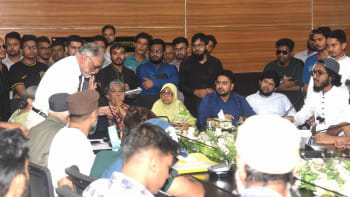My Pink Movember

Bangladesh is ranked 2nd by WHO in terms of mortality rate from breast cancer. About 16% of all female-cancer patients are victims of breast cancer according to a WHO study. Breast cancer is a very real issue, yet there has been a silent but concentrated effort to use the issue to draw dividing lines between the two genders, nuanced or otherwise. The month of November presents the perfect opportunity to bridge the gap between the two genders and foster relevant conversations. Men can be affected by breast cancer too and the women affected are someone's family, and the support system needed in case of incidence must include men. The men must take the issue upon themselves.
November has become affectionately known as Movember or "No-Shave November". The idea of No-Shave November started off as a web-based, non-profit organisation that urged people to contribute the amount they would save on grooming. The American Cancer society further used this Movember as a month to raise awareness about prostate cancer. In Bangladesh, perhaps we can broaden Movember's reach to highlight both Breast Cancer and Prostate Cancer simultaneously. Imagine men in beards and moustaches sporting the colour pink. This powerful image can go a long way to showing a united front on the issue. But first, we must also understand why this needs to be done.

At least in the sub-continent, the awareness campaigns designed for Breast Cancer may appear powerful on the surface but also come with dark and divisive overtones. Consider the example of Sunny Leone's campaign which took social media by storm. The entire video was shot from a woman's perspective, literally, with the camera lenses becoming the eyes a woman sees the world through. The sequence showed Sunny Leone interacting with a number of men, all of whom would subtly look at her breasts while talking to her. In the end, Sunny explains that if "women paid half as attention to their breasts as men did", breast cancer could be contained. While the statement is compelling, the narrative can only be seen as problematic. In this era, the campaign did not seek to draw attention to breast cancer itself but rather conflated it with the issues of sexism. In the end, the video served to isolate men by perpetuating borderline offensive stereotypes. Instead of just being about breast cancer, it was rather that men stare at our breasts and so should we. With such a divisive narrative, the real problem may just have become obscured.
In Bangladesh, one of our social media stars also engaged in another related campaign. However, this time, the narrative switched to one with disturbingly hyper-sexualised overtones. The nation lay in wait for a minor celebrity to bare all only to be told that she wouldn't be baring anything but explaining how important it is to have someone to check on your breasts for health purposes. The backlash that followed was understandable. You don't necessarily need someone to check on your breasts but you can do it yourself. However, getting your partner involved in the process is also important. To their credit though, both the videos had people talking, except perhaps they were not talking about the thing they were intended to.
Movember can just be the month where we can set these things right and across the entire spectrum of gender, we make this issue "Our Pink Issue". Let not the memory of Breast Cancer Awareness fade away as the Breasts Cancer Awareness Month does. Movember can serve to keep the issue in national consciousness while removing the divisive lines.
Photo: LS Archive/Sazzad Ibne Sayed


 For all latest news, follow The Daily Star's Google News channel.
For all latest news, follow The Daily Star's Google News channel. 



Comments